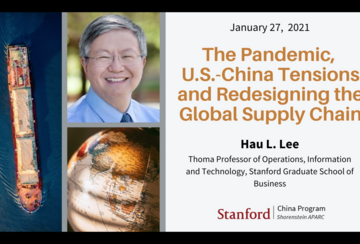APARC Newsletters
Sign up to receive updates from our experts and programs delivered to your inbox.

Southeast Asia Program Director Donald K. Emmerson compares responses across Southeast Asia to the February coup in Myanmar and reflects on the parallels and differences between the state of democracy there and in the United States.


Among the general population, however, researchers including Asia Health Policy Program Director Karen Eggleston find no evidence that additional care improves health outcomes.

The Myanmar Coup Is a Major Setback, but the Story of Myanmar's Struggle for Democracy Is Not Over
According to Scot Marciel, former U.S. ambassador to Myanmar and Stanford visiting scholar at APARC, building a democracy is a difficult process that can be upended, particularly when the military is politicized and has its own agenda.

Yong Suk Lee explains in the new volume, Shifting Gears in Innovation Policy, that while ‘catch-up’ strategies have been effective in promoting traditional economic growth in Asia, innovative policy tools that foster entrepreneurship will be needed to maintain competitiveness in the future.

As the 13th National Congress of Vietnam's Communist Party is selecting a new leadership team that will set the country’s course for the next five years, Vietnamese politics expert Paul Schuler discusses his new book on the state’s single-party legislature.

The Center has launched a suite of offerings including a predoctoral fellowship, a diversity grant, and research assistant internships to support Stanford students interested in the area of contemporary Asia.

The Soft War That America Is Losing
The Soft War That America Is Losing
The US depends far more on its soft power than authoritarian China does. Once it is lost, it is hard to get back.

Ahead of President-elect Biden’s inauguration and on the heels of the attack on the U.S. Capitol by a pro-Trump mob that has left America shaken, an APARC-wide expert panel provides a region-by-region analysis of what’s next for U.S. policy towards Asia and recommendations for the new administration.

China’s expanding military capacity in the Indian Ocean region poses risks for the United States and its partners, writes South Asia Research Scholar Arzan Tarapore in 'The Washington Quarterly,' offering a framework by which the Quad and others can build strategic leverage to curtail China’s capacity to coerce small states or posture for war.

Abe's resignation, the COVID-19 pandemic, and delaying the 2020 Tokyo Summer Olympic games have disrupted Japan's efforts to re-establish itself as a strong leader, both domestically and internationally, but it still has a chance to launch a comeback moment.

Both Japan's Suga and the incoming Biden administration should maintain the language of the "free and open Indo-Pacific" for consistency and to signal their ongoing commitment to maintaining a firm policy stance on China's ambitions.
Surging coronavirus cases and ongoing political scandals have docked Suga's approval ratings, but successfully handling the upcoming Olympics and taking further strides with the United States, ASEAN, and South Korea may help him rebound.
Russia and China Team Up on the Indian Ocean
Rhe US and its allies may have military dominance in the region, but it’s no guarantee of influence.

Addressing the epidemic of chronic diseases in India and other low- and middle-income countries requires comprehensive evidence on the cost-effectiveness of health interventions, argue APARC’s Asia Health Policy Program Director Karen Eggleston and Postdoctoral Fellow Radhika Jain.
Does Joe Biden's choice of Army Gen. Lloyd Austin III for secretary of defense offer a "safe choice" at the expense of preparing a strong front in the great-power competition with China and advancing women in senior leadership roles at the Defense Department?

Biden Administration Will Rely On U.S. Allies for Support as Tensions with China Continue to Rise
On the World Class Podcast, international security expert Oriana Skylar Mastro says conflict between China and Taiwan is plausible within the next 15 years, and the U.S. will likely be involved.
A Global Town Hall Welcomes America Back
Despite the reversals of the Trump era, a flurry of online diplomacy served as a reminder that the U.S. is welcome in Southeast Asia writes Donald K. Emmerson in The Diplomat.

The strengths and weaknesses of the Quad
Free Nations Must Speak for Australia
The Biden administration needs to rethink the entire nature of alliances for an era of heavy-handed economic diplomacy from Beijing says Oriana Skylar Mastro and Zack Cooper in an op-ed for the Australian Financial Review.

Sponsored by Stanford University’s Shorenstein Asia-Pacific Research Center, the annual award recognizes outstanding journalists and journalism organizations for excellence in coverage of the Asia-Pacific region. News editors, publishers, scholars, and organizations focused on Asia research and analysis are invited to submit nominations for the 2021 award through February 15.






